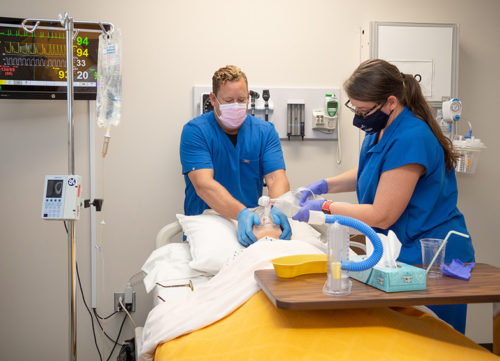As the Tulsa Day Center’s clinic director, Leslie Petty feels that the doctor of nurse practitioner degree she received from The University of Tulsa has helped her better serve underserved and vulnerable populations. “I am better able to design outcomes and articulate those outcomes to meet the community and funders’ questions regarding the challenges of working with the homeless population,” she said. “My doctorate took me to the next level beyond clinical care. I am equipped to conduct quality and process improvement projects and studies, which has been of great benefit in my role as clinic director.” (story continues below)
Become a Healer – We are Hiring – Norman Regional Medical Center
Although Petty (BSN ’83, DNP ’20) has worked at the Tulsa Day Center for 12 years, she said the decision to get her doctorate was a no-brainer. “The TU nursing program is state of the art, ahead of the curve,” she said. “The faculty and university strive to ensure the students have what they need to be successful. In addition, they actively work with community partners to identify health care concerns and how they can better prepare the students to meet health care challenges.”
This year, the TU School of Nursing celebrated its 50th anniversary. “We’ve been graduating BSN prepared nurses for 50 years, which is a little bit unusual for nursing,” said Bill Buron, who has served as director of the school since 2020. Historically, most nursing programs focused on diplomas and associate degrees in nursing.
In the early 1970s, the School of Nursing was forward thinking and helped establish the importance of a bachelor’s of science in nursing degree for professional practice. Today, the university is fortunate to build on that strong foundation and 50-year history.
In 2015, the university added a doctoral degree, like the one Petty obtained. In addition to two three-year DNP tracks (adult-gerontology acute care and family), the School of Nursing launched a new nurse anesthesia program in 2020. The first nurse anesthetist cohort graduated in August. TU’s NA program is the first and only in the state of Oklahoma.
The School of Nursing continues to grow and plans to offer several new online nursing programs within the 2023-24 academic year, including postmaster’s, DNP specialist, and adult-gerontology acute care nurse practitioner certificates; an RN-to-BSN degree; an accelerated BSN degree; and online master’s degree with four tracks (public policy, nursing informatics, nursing education, and nursing leadership).
The accelerated BSN program will be designed for second degree students who are interested in nursing. This online program is unique in that students will complete clinical rotations in their home areas, wherever they are in the country.
Online opportunities will open the door to many new nursing students. “Maybe they’re not ready to move, they are unable to come to Tulsa, but they see the value in nursing education at TU,” Buron said. “If you look at our unique approach to student success and strong academic outcomes, I think it’s easy to see the value that stems from a TU education.”
What sets TU apart from other schools is the faculty, more than 65% of whom hold doctoral degrees in nursing. Additionally, the university’s Oxley College of Health & Natural Sciences has teamed with local hospitals to provide clinical faculty, so students are learning from instructors who practice in hospital settings.
The university has also started a virtual reality in nursing education program and is one of the leaders in the field. “We actually look and see how students are responding to clinical situations in a virtual environment. We can then debrief on their experiences to help students gain confidence in their critical thinking and clinical judgment skills,” Buron said, adding that they are also working closely with faculty and graduate students in the university’s Tandy School of Computer Science to develop nursing skills training software in the virtual world, technology that does not currently exist.
“Virtual practice, in addition to high-tech laboratory practice in our state-of-the-art facilities, provides additional clinical preparation for TU students in realistic, simulated clinical environments,” he said. “We have expanded into new programs and specialties and grown with changes in health care, including increasing our creative use of technology to expand learning opportunities.”
Recent graduate Daesung “Joseph” Kim (BSN ’23) said he was always passionate about helping others and making a positive impact on people’s lives. “Nursing provides a unique opportunity to combine my compassion for others with my interest in the medical field, allowing me to provide care and support to those in need,” Kim said.
He said nursing is not just a profession, but a calling to serve others with compassion, empathy and skill. “It’s a dynamic field that constantly evolves with advances in health care, and I’m committed to being a lifelong learner in order to provide the best care possible,” Kim said. “I’m excited about the journey ahead and the positive impact I can make as a nurse, and I’m grateful for the support and opportunities provided by TU’s nursing program.”
For more information about the Oxley College of Health & Natural Sciences visit
https://healthsciences.utulsa.edu/nursing/














